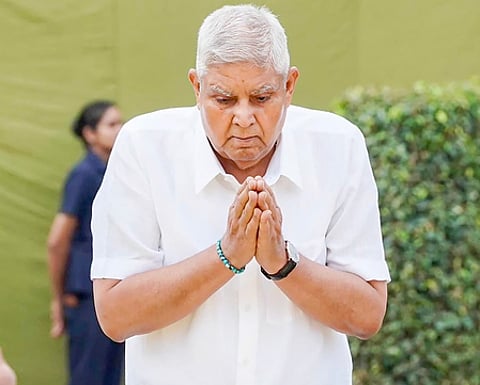Jagdeep Dhankar’s resignation is more than a crisis — it’s a symptom
India VP's departure exposes how constitutional roles are reduced to loyalty tests

First, the truth: hindsight is 20/20. All those media pundits and omniscient experts now bloviating — talking in an inflated way — about the whys and wherefores of the resignation of India’s Vice-President, Jagdeep Dhankar, are blowing hot air.
No one in the full spectrum of the media, including the servile lot ruling the roost, had any clue. All that you are getting now — the “building-up confrontation,” “the clock was ticking,” and his many transgressions — are afterthoughts, meant to besmirch his reputation and save the government’s face over the first-ever resignation of a Vice-President of India midway through his term.
The secrecy imposed on the Modi establishment is ironclad. This helps the government — no leaks is quite unprecedented in a noisy democracy that once had nosy journalists — but it also proves a huge hindrance when the feedback loop that speculation over an important appointment brings to the fore is shut off.
Surprise choice
In its zeal to spring a surprise, undeserving candidates like Dhankar — an utterly partisan and venal leader who disgraced the office of the impartial Chair of the Rajya Sabha, the House of Elders — slip through.
Had there been rival claimants for the job, even within the Sangh circle, the press might have done some preliminary scrutiny, even if based on the dirty linen washed by rivals eager to have a shot at the second-most important Constitutional office.
But Modi and Shah decided on Dhankar — perhaps impressed by all the shrapnel he lobbed at Mamata Banerjee, Chief Minister of West Bengal, from the fortress of Raj Bhavan in Kolkata, subjecting her to repeated attacks. Dhankar is a professional jobbing politician who came from the Devi Lal school of Lok Dal and then defected to the Congress. When he saw an ascendant BJP, he quickly switched loyalties after serial run-ins with Haryana Congress leaders.
Motivated leaks
His shenanigans as the vice-president — you, my beloved readers of SWAT analysis, are savvy and would have seen his conduct of the House: shutting down and insulting the opposition, making personal attacks — are in the public domain and disgraceful enough. The motivated leaks, such as the one that he forced a one-to-one meeting with United States President J.D. Vance because both were Vice-Presidents, or his desire for protocol parity with the President and Prime Minister, should not detain us. This is dirt being thrown to damage any political credibility that remains to a lightweight man ennobled by an office above his station.
The bigger issue that should bother every citizen of India is this: why, in the last 12 years, has ability and suitability been given the go-by in favour of appointing sycophants to the rarefied heights of India’s power echelons?
Said a senior BJP leader who has been part of both the Atal Behari Vajpayee government and the Modi government:
“The lower you bow, the higher you go. Why couldn’t Venkaiah Naidu, who made a good Vice-President and ran the Rajya Sabha with good humour, be made the President? And someone like him — a politician who was a colleague of Modi in the so-called ‘second generation’ of BJP leaders such as the late Pramod Mahajan, Rajnath Singh, and others like Nitin Gadkari, even those put out to pasture like L.K. Advani and Murli Manohar Joshi — be given constitutional jobs 11 years ago? Modi is an icon now, a three-term PM — what threat would they have presented? They are loyal soldiers of the RSS. Yet sycophants were preferred, turncoats were given important posts. Someone like Dr Harsh Vardhan, who was a favourite of the entire Sangh, was dropped from the Cabinet and not even allowed to contest his Lok Sabha seat.”
Message to cadre
This has sent a terrible message to the cadre. And don’t forget, the BJP is a disciplined cadre-based party that accepts all decisions and carries on — unlike the Congress. But the tag “the party with a difference” is now a joke.
The poor bench strength of the BJP is also now showing in stark contrast. This is evidenced in the inordinate delay in the announcement of the next BJP President. The RSS is questioning the poor decision-making skills of those who currently call the shots.
The biggest question of them all, which is reflected in the way India is governed, is this: do we truly need these white-elephant colonial British relics which cost the exchequer huge amounts and are basically parking bays for jobs for the boys and girls? Does India need a king after the British left, or was this just Nehru’s Anglophonia? Nearly 80 years later, perhaps the time has come to abolish the offices of “His Excellency” the Governor (in all states and Union Territories), the President, and the Vice-President.
It would be a clean break from the time India was ruled and would save a huge amount of real estate and money. After all, we abolished the traditional rulers and Maharajas — so why impose a new class of modern-day Maharajas?
Perhaps the most persuasive reason to make this fundamental change is the persona of Dhankar — who can then go down in Indian history as having made a seminal contribution. Because, currently, the only person mourning him is Congress leader Jairam Ramesh — and thereby hangs a tale I will soon tell you.
Bonus: Shashi Tharoor is unlikely to become VP.






